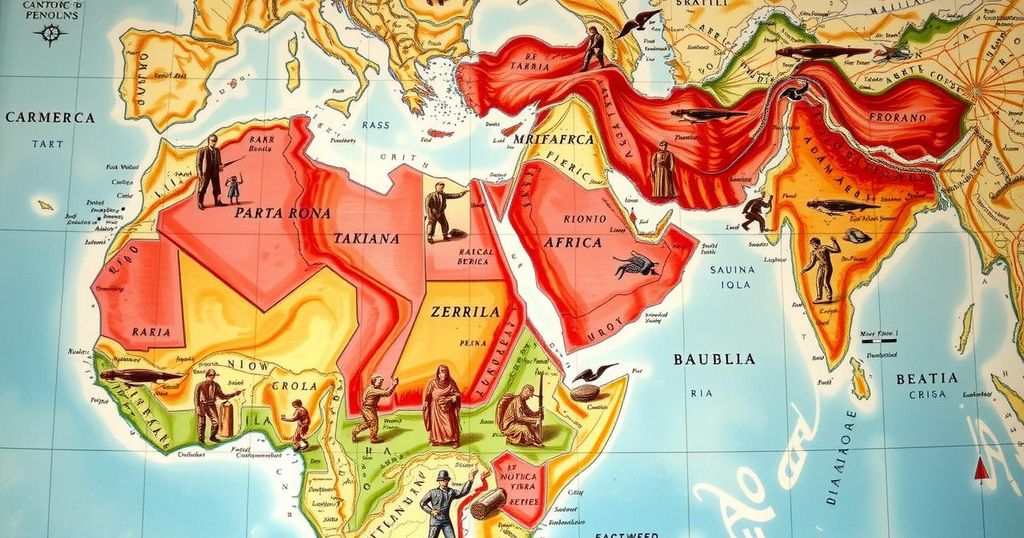Strategic Relations Between Morocco and Mauritania: A Path to Regional Cooperation

The relations between Morocco and Mauritania are critical for regional stability and integration, shaped by historical ties and mutual interests. The ongoing Western Sahara conflict positions Mauritania as a neutral participant in Maghreb dynamics while fostering recent diplomatic improvements. Potential joint initiatives in security and economic development, including critical projects like the Atlantic Gas Pipeline, highlight the strategic significance of their bilateral relations for addressing common challenges in the region.
The strategic relations between Morocco and Mauritania are pivotal for regional integration and stability in the Maghreb. Since the initiation of the Moroccan Western Sahara conflict, Mauritania’s position as a geographical buffer between Algeria and Morocco has been increasingly significant. This positioning complicates Mauritania’s involvement in peace efforts due to varying political and economic interests influenced by foreign pressures, particularly from Algeria. Recent diplomatic engagements, such as King Mohammed VI’s welcome of President Mohamed Ould Ghazouani, suggest a strengthening of ties aimed at collaborative initiatives in security, trade, and economic development.
Historically, the bilateral relations reflect a profound significance that intertwines the concepts of security, stability, and mutual cooperation. Both nations have forged a comprehensive partnership that encompasses culture, religion, economy, politics, and security, essential to addressing current challenges. Their geographical proximity highlights joint concerns with security threats stemming from the Sahel-Sahara region, encompassing terrorism, organized crime, and illegal migration. In this setting, Mauritania maintains a position of neutrality in Moroccan territorial disputes while engaging in initiatives that promote economic cooperation, such as the gas pipeline project linking Nigeria and European markets.
The strategic alliance is reinforced by shared geopolitical interests, particularly regarding the Guerguerat crossing, which enhances trade flow. Both Morocco and Mauritania are focused on sustainable development and integration efforts within their southern provinces. King Mohammed VI’s vision for these regions aims to create significant economic corridors, on which various infrastructure projects, including the pivotal Atlantic maritime port of Dakhla, rely. This development not only connects Africa and Europe but serves as a catalyst for global investment and trade.
Furthermore, the partnership extends beyond mere economic collaboration, including coordinated security strategies to tackle regional threats. Engaging in military and naval cooperation facilitates a comprehensive regional security system positioning both nations as stabilizing forces in the area. The potential for mutual growth in sectors such as green energy, fisheries, and eco-tourism underscores the advantages of a unified approach to regional challenges, ultimately enhancing job creation and quality of life.
Moreover, active diplomatic cooperation within global forums represents a significant step towards reinforcing international stability and development agendas. Mauritania’s role in maintaining regional balances is vital, particularly in the evolving challenges posed by security threats and economic demands. Both nations are poised to emerge as models of regional cooperation, promoting sustainable projects that reshape North Africa’s economic landscape.
In summary, Moroccan-Mauritanian relations signify a strategic partnership that encompasses shared goals and mutual development. Initiatives like the Atlantic Gas Pipeline are emblematic of the potential to enhance regional collaboration and provide innovative solutions to common challenges. The need for a flexible political framework remains essential to capitalize on historical and cultural ties, ensuring that joint endeavors lead to substantial economic benefits. The future of North African cooperation relies on clearly defined strategic interests, facilitating a prosperous and integrated continental model for progress.
The strategic dynamics between Morocco and Mauritania have evolved significantly, especially since the onset of the Moroccan Western Sahara conflict. This conflict has transformed Mauritania into a key player in the Maghreb region, navigating a delicate balance between the competing interests of Morocco and Algeria. Historical ties and shared geographical concerns have fostered a partnership aiming to enhance regional stability, economic development, and security collaboration. Recent diplomatic exchanges signal a renewed focus on cooperation that addresses pressing regional challenges, setting the stage for mutual growth and resilience against various socio-political threats.
The strategic partnership between Morocco and Mauritania embodies a promising model for regional cooperation that integrates shared interests and historical ties. By fostering joint initiatives in economic development, security, and diplomacy, both nations could effectively navigate contemporary challenges while enhancing stability in the North African context. Successful collaboration will hinge on a robust political and economic framework that prioritizes strategic integration and sustainable development, ultimately contributing to the broader goal of regional prosperity and cohesion.
Original Source: moderndiplomacy.eu








